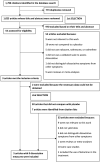Treatment of dissociative symptoms with opioid antagonists: a systematic review
- PMID: 37860852
- PMCID: PMC10591526
- DOI: 10.1080/20008066.2023.2265184
Treatment of dissociative symptoms with opioid antagonists: a systematic review
Abstract
Background: The clinical guidelines for the treatment of dissociation focus primarily on psychotherapy. However, different psychoactive drugs are used in clinical practice. The use of opioid antagonists has been proposed as a therapeutic option based on the theory that dissociation might be a phenomenon mediated by dysregulation of the endogenous opioid system.
Objective: To review and meta-analyse the available evidence on the efficacy of the opioid antagonists naltrexone, naloxone, and nalmefene as treatments for dissociative symptoms and disorders.
Method: The PRISMA guidelines were followed, and this review was registered in Prospero with reference number CRD42021280976. The search was performed in the PubMed, Scopus, Web of Science, EMBASE, PsycINFO, and PubPsych databases.
Results: 1,798 citations were obtained. After removing duplicates and applying inclusion and exclusion criteria, we included 5 comparative studies with 9 dissociation measures that had included a total of 154 participants, of whom 134 had been treated with an opioid antagonist. The results of the meta-analysis showed a treatment effect for dissociation when using opioid antagonists [pooled d = 1.46 (95% CI: 0.62-2.31)]. However, the studies we included were very heterogeneous [Q = 66.89 (p < .001)] and there may have been publication bias.
Conclusions: Although more research is needed and the results must be interpreted with caution because of the limited amount of data and heterogeneity in the studies and their methodological qualities, opioid antagonists (particularly naltrexone) are promising candidates for the treatment of dissociative symptoms and showed a moderate - large effect size in reducing these symptoms.
Introducción: Las guías clínicas para el tratamiento de la disociación se centran principalmente en la psicoterapia. Sin embargo, diferentes sustancias psicoactivas se usan en la práctica clínica. El uso de antagonistas opioides se ha propuesto como una opción terapéutica basada en la teoría de que la disociación podría ser un fenómeno mediado por la desregulación del sistema opioide endógeno.
Objetivo: Revisar y meta-analizar la evidencia disponible sobre la eficacia de los antagonistas opiáceos naltrexona, naloxona y nalmefeno como tratamientos para los síntomas y trastornos disociativos.
Método: Se siguió la guía PRISMA y la revisión se registró en Prospero con número de referencia CRD42021280976. La búsqueda se realizó en las bases PubMed, Scopus, Web of Science, EMBASE, PsycINFO y PubPsych.
Resultados: Se encontraron 1.798 citaciones. Tras eliminar duplicados y aplicar los criterios de inclusión y exclusión, se incluyeron 5 estudios comparativos con 9 medidas de disociación que incluían un total de 154 participantes, de los cuales 134 habían sido tratados con un antagonista opiáceo. Los resultados del meta-análisis mostraron un efecto del tratamiento para la disociación al usar antagonistas opiáceos [d combinada = 1,46 (95%IC: 0,62–2,31)]. Sin embargo, los estudios incluidos eran muy heterogéneos [Q = 66,89 (p < 0,001)] y podría haber sesgo de publicación.
Conclusiones: Aunque es necesaria más investigación, así como los resultados deben ser interpretados con cautela debido al limitado número de datos y la heterogeneidad de los estudios y sus calidades metodológicas, los antagonistas opiáceos (particularmente la naltrexona) son candidatos prometedores para el tratamiento de los síntomas disociativos, mostrando un tamaño del efecto moderado-grande en la reducción de estos síntomas.
背景:解离治疗的临床指南主要侧重于心理治疗。然而,临床实践中使用不同的精神活性药物。基于解离可能是内源性阿片系统失调中介现象的理论,使用阿片拮抗剂已被提议作为一种治疗选择。
目的:回顾和元分析关于阿片类拮抗剂纳曲酮、纳洛酮和纳美芬治疗解离症状和疾病疗效的现有证据。
方法:遵循 PRISMA 指南,该综述在 Prospero 注册,参考号 CRD42021280976。 检索是在 PubMed、Scopus、Web of Science、EMBASE、PsycINFO 和 PubPsych 数据库中进行的。
结果:获得 1,798 次引用。 在删除重复项并应用纳入和排除标准后,我们纳入了 5 项比较研究,涉及 9 项解离措施,总共包括 154 名参与者,其中 134 人接受过阿片类拮抗剂治疗。 元分析的结果显示,使用阿片类拮抗剂对解离有治疗作用[汇总 d =
结论:虽然需要更多的研究,并且由于研究中的数据量和异质性及其方法学质量有限,必须谨慎解释结果,但阿片类拮抗剂(特别是纳曲酮)是治疗解离症状的有前途的候选药物,并显示出中等至较大的减轻这些症状的效果。
Keywords: Disociación; Dissociation; antagonistas opiáceos; meta-analysis; metanálisis; naloxona; naloxone; naltrexona; naltrexone; opioid antagonists; 元分析; 纳曲酮; 纳洛酮; 解离; 阿片类拮抗剂.
Plain language summary
The results of the meta-analysis showed a treatment effect for dissociation when using opioid antagonists [pooled d = 1.46 (95% CI: 0.62–2.31)].The results must be interpreted with caution because of the limited amount of data and heterogeneity in the studies and their methodological qualities.Opioid antagonists (particularly naltrexone) are promising candidates for the treatment of dissociative symptoms and showed a moderate – large effect size in reducing these symptoms.
Conflict of interest statement
No potential conflict of interest was reported by the author(s).
Figures





References
-
- American Psychiatric Association . (2014). DSM-5: Manual diagnóstico y estadístico de los trastornos mentales. Editorial Médica Panamericana.
Publication types
MeSH terms
Substances
LinkOut - more resources
Full Text Sources
